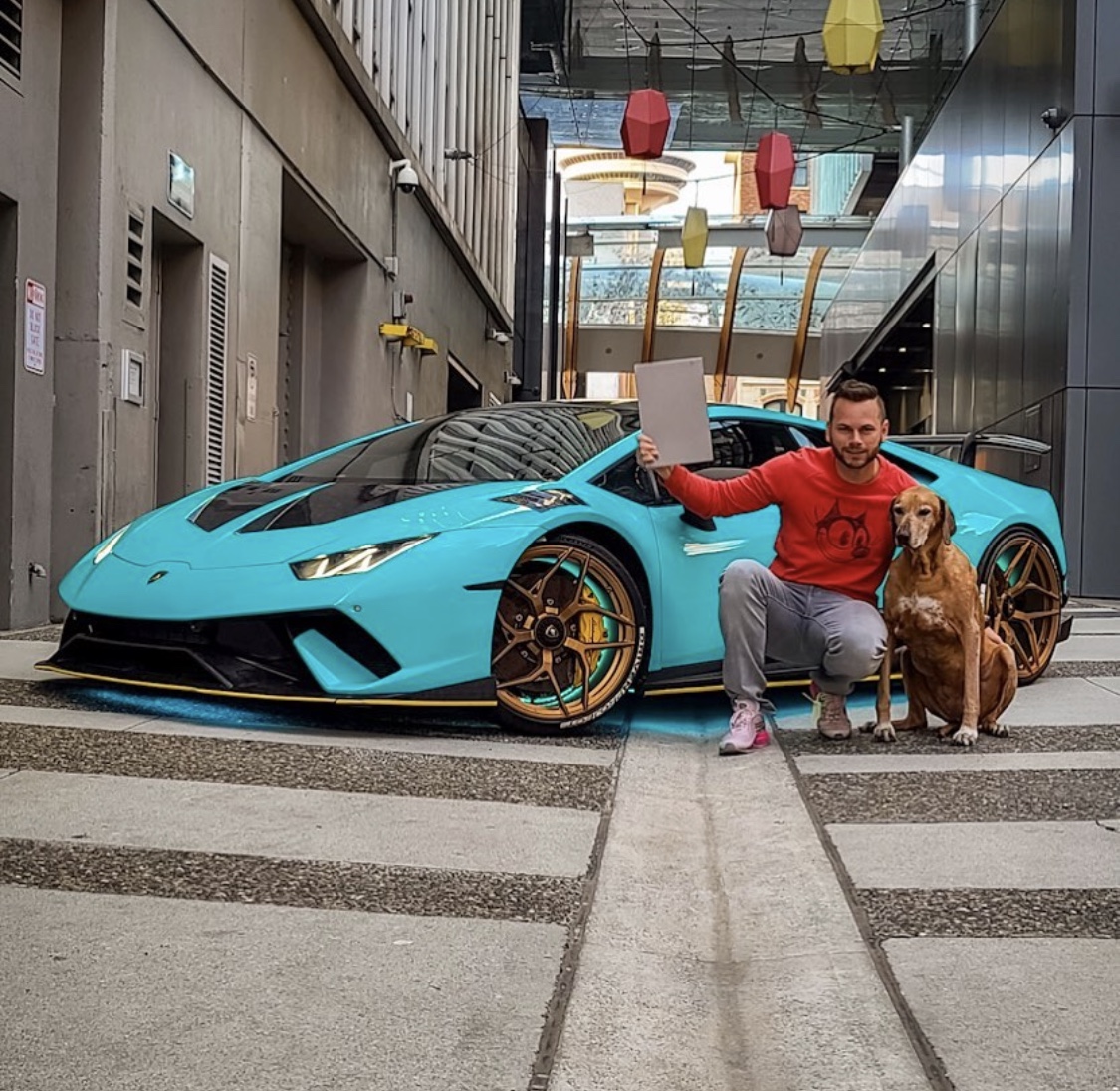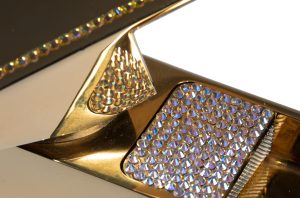Checkout this heavily modified 2018 Lamborghini Huracan Performante owner by Kevin Gordon.
Kevin Gordon, a 33-year old Vancouver resident who decided at an early age he was going to be successful in business. With a life-long passion for cars and having attended the Vancouver International Auto Show, he dreamed of one day owning a Lamborghini.
In his mid-20s, Kevin started a company out of his apartment and the early days were a struggle, working and sleeping in the same office space. Fast forward five years to 2018 when after a lot of hard work, he sold his company and on the same day, he purchased the car of his dreams – a 2018 Lamborghini Huracan Performante.
Can you remember March 31st of 2018? Kevin Gordon sure can.
“That was a big day,” the 32-year-old Vancouverite says with a laugh. “I was speaking at an event the night before so I woke up in Toronto, hopped on a plane—I flew business class which I don’t normally do—arrived in Vancouver, went to my house, dropped off my luggage, went to BMO and got a bank draft, drove straight to Lamborghini Vancouver—they didn’t know who I was, —and I bought one of the baddest Lamborghinis ever made.”
He continues: “It was pouring rain, I drove straight home to my parkade and literally sprinted to Earl’s, where my whole team was waiting for me at our company celebration.”
And amidst that party to celebrate the sale of the tech start-up he co-founded, amongst the hugs and high fives, no one knew their boss had just bought his dream car. That would change of course, and thanks to Instagram, most if not all of the civilized world knows all about Kevin Gordon’s 2018 Lamborghini Huracán Performante.
“It’s the most modified 2018 Lamborghini Huracán Performante in the world,” he says, basing that statement on Instagram’s global reach. “I feel if there was one somewhere on the planet (more modified), it would be on Instagram.”
After just three days on the social media platform, he had well over 200,000 likes (check it out at kevin.gordon).
Gordon grew up in the White Rock area and describes his younger self as a really ambitious kid who hustled all the time.
“Before I knew what the word ‘entrepreneurial’ meant I was doing entrepreneurial stuff,” he says. “I was always building something, scheming something, trading stuff.”
But before those formative years came a passion for cars, one passed down to him from his parents.
“We didn’t have a lot of money but they loved them,” he says of his mom and dad, adding his parents had a shop in the back of their house where they taught young Gordon how to work on cars. “We fully tore cars apart there, right down to the frame and we’d build them back up.”
At age 15, his passion for cars and his budding business acumen merged. He started buying car parts locally, and shipping them all over Canada. This was also the start of Gordon connecting the offline and online worlds, something that would prove prophetic for his future. He would buy parts traditionally—at garage sales—and sell them online to people all over the continent. As he was into modified cars—particularly Toyota Supras, of which he owned 10 before the age of 20—it was this marketplace where he found a niche.
“Aesthetically I loved them, they were ahead of their time in a lot of ways,” he explains of his fondness for Supras. “They’re really fun to drive, love the forced induction aspect of them.”
This was a time when Craigslist was getting started, and before people were comfortable connecting their credit card number to a computer. It was also a time when computer chips were starting to show up in cars, and for the teenager this too proved a match made in heaven.
“You could do piggy-back or stand-alone ECUs and tune them with your own computer for things like fuel ratio use. And that’s where I totally geeked out.”
Looking at Gordon today it’s difficult to imagine a ‘geek’ label sticking to him but he says it describe his high school self.
“I was a scrawny kid with glasses and no confidence. I went to a few schools so I never had a steady group of friends,” he says. “Dogs, cars, computers…those were my favourite things.”
As to high school: “It was a really bad time. I had a really, really rough go of it. Got bullied, didn’t have a lot of friends. Didn’t go to parties or on dates.
“So I wanted nothing to do with school.”
That’s not to say he didn’t embrace learning, however. In this case, HTML, CSS and JavaScript.
“I was really interested in it and Craigslist was just starting to take off and I could see dealers were interested in marketing their cars there,” he recalls. “But they were just posting the worst, text-based ads with a couple of crappy pictures.”
So Gordon wondered if there was a way to automate that process for dealerships, thus provide a service to those dealers that didn’t have the time or technological know-how. Translation: every single one.
So he wrote a code, which became a script, that would ‘crawl’ dealership websites, look at their inventory, and then extract that as code. Then the ‘bot’ he created would upload and post an ad on Craigslist. And since it was posted with HTML formatting, he says, it looked very professional and stood out.
Not surprisingly, dealerships were “super-stoked to pay $500 a month for that service,” and all it took was for Gordon to spend a couple of hours setting up the program on the dealers’ system. He took a job at a White Rock dealership, hired ostensibly to set up a web-based marketing system, but he seized the access he was given to learn about the business from the inside. He learned a lot, he says, most notably that he didn’t like working at a dealership.
“I just didn’t feel it was an environment I would really grow,” he says somewhat tactfully.
Fortune, or in this case misfortune, stepped in again. Gordon, now 21, broke his tibia and his fibia playing baseball and spent two months in bed. Lots of time to sit, think and plan his next move.
“That’s when I stumbled across the Jim Pattison Group and how terrible their online presence was. I felt there was an opportunity to just get them as a client (he was still running and selling the Craigslist system for dealers) so I wrote out 15-page marketing-slash-business plan and just emailed it off to them.”
Audacious to be sure. “They’re this massive corporate company and I’m, well, basically just a kid who never went to university.” But it worked, with the company giving him one dealership, on a short-term basis, to try out his plan. As to that plan, Gordon sums it up as “taking a holistic approach to their entire digital footprint and just making it best-in-class.”
Again, to make a short story even shorter, he worked day and night, by himself, and four months in he was overseeing the entire group’s e-commerce division. He hadn’t turned 23 yet, and he had a direct line to Jimmy Pattison. Those familiar with Jimmy’s entrepreneurial beginnings, flipping used cars to his UBC classmates, will see obvious parallels to his young charge’s burgeoning career.
Gordon’s exposure in the industry was now on full display across North America, as was his firsthand experience with the tech companies that were servicing the automotive industry. He wasn’t impressed with what he saw.
“I honestly just felt like they sucked. They didn’t care. They weren’t transparent. They were expensive. They were slow. They were dated.”
You know where this is going. Three years into his stint with the Pattison Group, Gordon’s engrained entrepreneurial spirit did battle with his current corporate gig. Take a wild guess which one prevailed?
Teamed with Nick Williams —a friend from his White Rock days who was his first hire into his Pattison Group team— Gordon walked away from the perks, title and status at Pattison to start his own company. Convertus Digital Inc. began life in Gordon’s Yaletown apartment with just him and Williams as employees. Today, some five-and-a-half years later, the company employs 75 people in a low-slung building in the shadow of BC Place.
“(The auto dealership business) is an antiquated industry,” Gordon contends. “It’s an old boys club and it’s been very slow to change. I’ve always been very vocal about that.”
Essentially, Convertus is a digital-based solution system that helps car dealerships and auto manufacturers run their business more efficiently. It provides things like inventory management solutions, a VIN decoder, portals for customers into Facebook, and a suite of marketing tools integrating Google and Google Ads.
“We just started out one hundred per cent digital. Our team is incredibly young. Our median age is 26. We just tried to be faster, better than the other guys.”
And like any innovative tech start-up—these guys built their own Artificial Intelligence system—Convertus caught the attention of the big traditional players, in particular Trader, formerly known as Auto Trader.
Fifteen months before this the private equity firm that owns Trader contacted Gordon about a possible tender for services offering. In essence, Trader was looking to improve its website platform, or in tech-speak, it’s “tech stack.” Trader is, by far, bigger than any other company in terms of providing dealership services in Canada. Convertus was one of two dozens companies to be in the mix, and Gordon says of those his was at the bottom in terms of annual revenue. “We were the youngest, we were the smallest.” Translation: a long shot at best.
What followed was a 10-month vetting process, followed by a shortlist that was very intense with ‘granular’ due diligence.
“They went through our books, interviewed our team, did client surveys, hired an outside tech firm to come in and tear our stuff apart,” says Gordon.
Then came a letter of intent to purchase Convertus from Trader. They started talking numbers and it all added up for both parties, with a purchase prize in the eight digits. The deal saw Trader’s entire client base migrated over to Convertus’s tech stack. And it saw Gordon and William’s bank accounts balloon.
Gordon and Williams are still at the helm of Convertus, and according to the co-founder nothing has changed in the day-to-day or staffing of the company since being acquired.
“They’ve not disrupted the culture here at all,” said Gordon, a culture, it should be noted, that includes very casual West Coast togs, Nerf guns on every desk and a ping pong table.
Of course, one big change is the co-founders’ wheels. Gordon says Williams’ big purchase was a condo. “He loves cars too but didn’t want to get one,” says Gordon. “So I bought him an Audi R8.”
As to his own celebratory purchase, he admits that as the negotiations with Trader became more intense and focused, he did start to think about what he’d do with the money.
“I’m not a fancy person in general. I’m wearing a ten-dollar t-shirt. I’ve had the same watch for years. Same apartment,” he notes. “But I’ve loved supercars my entire life, but obviously one had never been in reach.”
Once it seemed that dream could become a reality he drove a number of new supercars, on road and on racetracks, including Ferraris, McLarens and Lamborghinis. In the end, it was the latter that won out.
“I bought, essentially, the fastest production Lamborghini that’s ever been made.”
But that wasn’t good enough for Gordon.
“Its really symptomatic of everything in my life. I just want to improve things. My company. Myself. Other people.”
So how do you improve on a V10-equipped, all-wheel drive supercar that received top reviews from the world’s motoring press?
Says Gordon: “The car has been completely torn apart. The fuel system has been completely replaced, and several inter-coolers added. I supercharged it, so it’s now like 900 horsepower. It’s got Brixton Forged wheels on it. It’s got a full aftermarket carbon-fibre body kit.
“Essentially, every single thing on this car that can be changed has been changed,” he says, adding that the warranty on the half-million dollar car was voided mere days after he purchased it thanks to the modifications.
He has no regrets about that, or about selling his company.
“I don’t regret it for a second. It was really good for our team too. It gives them stability and we also can pay people more. We did a company wide, significant bump in pay.
“I look at us now as still a start-up, only corporately funded. We’re still scrappy, still very agile.”
Just like the co-founder’s dream ride.
So how much is a Huracan performante?
About $281,048
What does it actually sound like?
Special Slay Concierge Note
Our high end ateliers across the world are capable of recreating any look seen on Slaylebrity. Contact sales@slaynetwork.co.uk or click the contact us icon to chat with slay concierge.
BINGE ON THE WORLDS MOST INTERESTING ENTERTAINMENT CONTENT FOR FREE NOW
Source Driving.Ca






